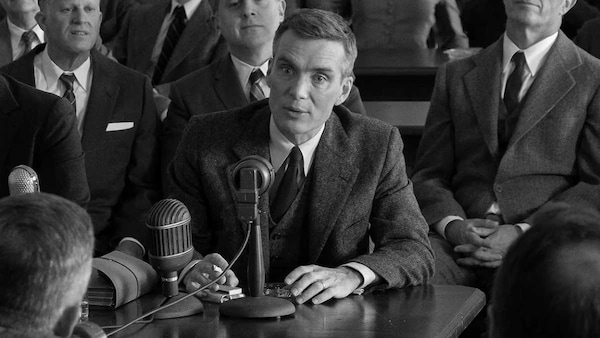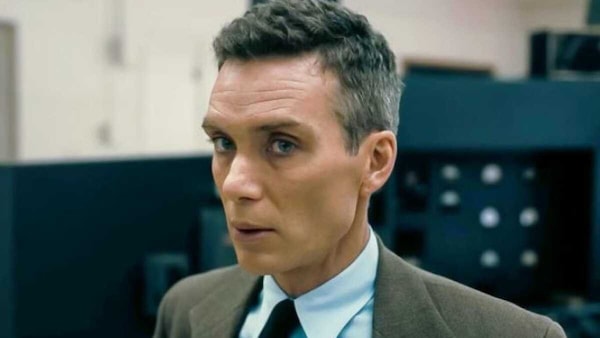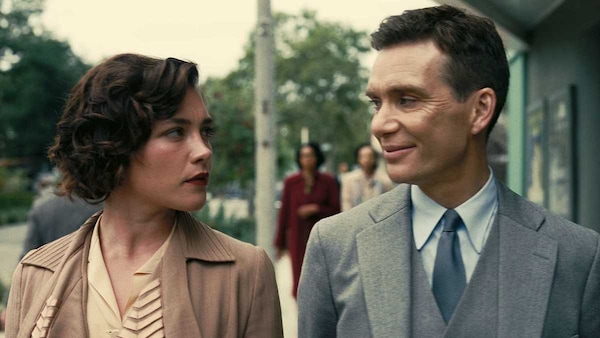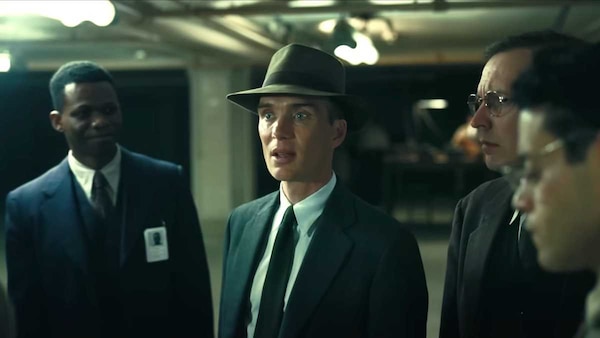Oppenheimer: The Murky Magnificence Of Christopher Nolan's Biopic
This is #CineFile, where our critic Rahul Desai goes beyond the obvious takes, to dissect movies and shows that are in the news. Today: Christopher Nolan's Oppenheimer.

Last Updated: 02.17 PM, Jul 21, 2023
“WHY won’t you fight?” asks an anguished woman. Her husband does not respond, or more accurately, he is unable to. She cannot fathom the muteness of a man whose genius has been deafeningly loud. His work has pummeled a war into submission — it is silence wearing the sound of violence; peace posing as the pinnacle of physics; triumph camouflaged as blinding tragedy; a physical explosion in the cloak of cultural implosion. But now, in the face of a political witch hunt, the father of the atom bomb, J Robert Oppenheimer, is reduced to a vessel of passive molecules. The most famous person on the planet is paraded like a shadow of infamous roots. He is not resisting this array of attacks on his legacy. For some reason, he is letting them — led by a narcissistic ex-ally — drag his reputation through the mud. He is being investigated for a very human past. And he is being soiled for not singing to the choir of nuclear music. So it’s only fair for his long-suffering wife, Kitty, to question his sudden reticence. It’s only natural for her to probe his dip in combatant charm. She cannot understand his strange surrender to the vagaries of power. Nobody can.

Except, perhaps, the man himself. In Christopher Nolan’s Oppenheimer, Cillian Murphy plays the blue-eyed theoretical physicist like an intellectual at odds with the emotional chronology of greatness. He seems to be feeling his way through life — and his fraught relationship with a nation that nurtures him with hate and dismantles him with love — in reverse. His grasp of science kills his youth. He is cursed with the mortal antiquity of genius: across his student days in Europe, his professor years in California, and finally, as the maverick director of The Manhattan Project, a top-secret military program where his team scrambles to make a bomb in the nothingness of New Mexico. In his eyes, he is building death — and becoming death — to ensure the future of life. As a Jewish scientist, he believes he is splitting evils, not merging them.
But two of the film’s three intertwining timelines are fused by courtroom drama: the 1954 Security hearings (where the US Atomic Energy Commission grills Oppenheimer for alleged communist links and revokes his Q clearance), and a 1958 trial in which former AEC head and Oppenheimer rival Lewis Strauss (Robert Downey Jr.) encounters a roadblock in his appointment as Secretary of Commerce. It’s like seeing the architecture of history as it happens, where legacy flirts with life, and effect with cause, while the viewer sifts through the ruins of perception and consequences of truth. In other words, the monochromatic images and bureaucratic tensions of the 1950s reveal the birth of “Oppie” Oppenheimer, the man of science and sin who — much to his wife’s wonder — embraces the art of repentance. His innocence grows back, like a man recouping the fragility of a lost youth. His hope loses its wrinkles, like a retired athlete returning to the freedom of childhood fields.

The courtroom portions are haunted by the void of Oppenheimer, almost as if all the politics and verdicts in the world pale in comparison to the complicity of his cross. He is so consumed by the promise of soldiering his flair (he even dons a military uniform), flaunting his duty and proving his patriotism that the time he helps puncture becomes the space that punctures him. He is so excited by the moral and cerebral certainty of his mission that he engineers a monster for all time. People like Lewis are miffed that they aren’t important enough to be that monster. Nobody gets that Oppenheimer’s mistakes, like his ambitions, transcend the pettiness of living — they shape the fullness of life itself. He never concerns himself with the business of humanity until he is forced to feel alive. We don’t see the horrific trauma of the bomb in Japan, but we do sense the stoic withering of the American who assembled it. We also sense his disillusionment — not as a ride but as a middle-aged journey — for ambushing the heavens to imitate an act of God. He didn’t factor in the storm after the atomic calm. In the process, watching him is akin to noticing the hidden terms and conditions of a tragedy. When the President mocks his moral turmoil by asking him if the people of Hiroshima care about who made the bomb (“only the guy who dropped it”), he is condemning Oppenheimer to the cruelty of excesses. Here’s a man who was once revered for not owning his glory, only to be reviled for trying to reclaim it.
RELATED | Oppenheimer: How Manhattan Project Personnel Lived At Los Alamos
The non-linearity of his guilt defines this film. A biopic that, at its boldest, is a messy manifestation of a mind torn between redemption and reckoning. Nolan deconstructs the stature of his subject without compromising on his scale. It’s a tricky balance that throws up a marriage of contrasts. There’s action in words, silences in action and slow-burning grief in the joy of invention — the scene of the Trinity, where the bomb is first tested to devastating success, mines the cold distance between light and sound. The film makes us live and grow old in that lingering pause between fire and explosion; between foresight and hindsight.

The result of such film-making is typically furious, where moments don’t end so much as collapse into other moments; where vignettes do the work of dialogue; where the velocity of thinking replaces the continuity of being; where blink-or-miss cameos morph into disorienting memories. The screenplay acts like a runaway bus that might explode if it drops below a certain speed, and the score reframes incoherence as the symptom of lived-in dread. When the man hallucinates and confronts his denial, it is in front of applauding colleagues, a scene whose stillness suggests that Oppenheimer will never come to terms with the dichotomy of his genius. He will never be able to accept that his synonym for life is death; that his personal struggle is a catalyst for mass destruction. When he is sprawled across his lover, naked, there’s a natural agency about their bodies that make them incidental to their brains.
In many ways, Christopher Nolan is the opposite of film-makers who dumb it down and patronise their audiences. He wills us onto a chase of frenetic intelligence and awareness, and conflates originality with narrative momentum. There are instances when this expectation from moviegoers borders on entitlement — like in Tenet and parts of Oppenheimer — but the viewer is seldom pushed into a corner of simply watching a film. It’s not just mental engagement. It’s a lot more, because in the creative density we tend to detect pieces of who Nolan chooses to be; we see where his stories subconsciously emerge from. There’s an unyielding intimacy in the distance he creates from the norms of big-screen imagery.

There’s much of him to be found in his purist and misunderstood protagonists. Men who push the boundaries of their craft — the Dark Knight trilogy, Memento, The Prestige, Inception, Tenet, Interstellar — but must also battle the stubborn idealism (practical effects, IMAX cameras, an aversion to digital, an allegiance to film) of their talent. Reluctant heroes who often straddle both sides of the law: a revisionist reflection, perhaps, of a third Nolan brother who is an alleged contract killer. No time for the diversity of female characters: a reflection of a childlike wonder that demarcates domestic realism from forensic imagination. The curiosity for method as a prefix to human madness — through themes of magic, memory, dreams, global warming, space, the sensory dissonance of war. The recurring companionship between science and love: a private family life that sustains his vision (his wife, Emma Thomas, is a producer) and protects his legacy. Oppenheimer stages a siege on this plurality of self, like a bomb whose blast is fractured into the suspense of ticking. Like a courtroom thriller, whose sentences are splintered across time and tide. Or like a movie-making prophet who fears the anguished silence of a fan asking him, “Why won’t you fight?”
